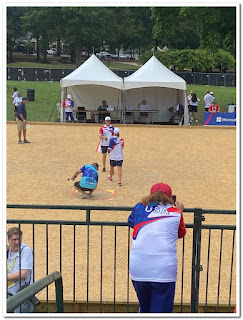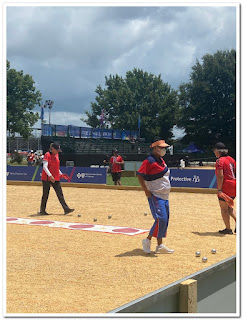Shirley and I went to Birmingham, Alabama, for the 2022 edition of The World Games. Women's petanque Precision Shooting was one of the events, and our friend "Bekah Mo" Howe came away with the silver medal!
The following is from:
Dan Ninham
Special to ICT
A Crow Creek Sioux woman has become the first U.S. athlete to medal in the sport of pétanque, bringing home silver earlier this month with record-breaking points in the 2022 World Games competition.
Rebekah “Bekah” Howe, of Port Townsend, Washington, powered her way to the finals in the Precision Shooting women singles competitions at the World Games in Birmingham, Alabama, but fell to Cambodian athlete Ouk Sreymom, who also won gold in women’s doubles.
Howe notched the highest number of points ever recorded in competition by a U.S. pétanque athlete to claim her first medal on a worldwide stage.
“This silver was my first international medal,” Howe told ICT. “It has been a dream of mine to get to represent the USA in an international competition. It was an honor to get to play against some of the best women pétanque players in the world. I have seen them all play in competitions on YouTube, and I admire them all.”
Howe and her pétanque partner, Janice Bissonnette of Fresno, California, also competed in the doubles division but did not advance to the finals.
The game (pronounced pee-TONK) originated in France in the early 1900s and is considered a boules or ball sport like bocce, lawn bowling and raffa.
The name means “foot planted” in French, and rules require that players keep their feet planted to the ground.
Howe is a two-time national champion and a six-time regional champion. In 2018, she won both the National Women’s Singles title and the National Mixed Doubles with partner Silas Holm, who is also her husband and trainer.
In the recent World Games, she scored 38 points in the semi-final heat heading into the finals, to set a U.S. record.
“Thirty-eight points is the highest score in precision shooting in pétanque for the U.S., men or women, during any World Games or championships,” Ernesto Santos, president of the Federation of Pétanque USA, told ICT. The federation is the official governing body of pétanque in the U.S.
The World Games, held in Birmingham July 7-17, featured athletes from about 100 countries competing in more than 30 non-Olympic sports that included handball, korfball, squash, lacrosse, racquetball, canoeing, flag football, dance and roller sports, gymnastics and martial arts.
Eight countries competed this year in pétanque: Belgium, Cambodia, Canada, Denmark, France, Germany, Thailand, and the United States.
‘It kind of snowballed’
By day – and night - Howe is a surgical technologist at her local hospital, Jefferson Healthcare, at the Surgical Associates Clinic.
A citizen of the Crow Creek Sioux Tribe, she was introduced to pétanque after a man who had been to France installed a pétanque court at a local bar. He taught those interested the basics of pétanque and began hosting doubles leagues.
The players quickly branched out to formal pétanque tournaments in the Seattle and Portland areas, Howe said.
“A player from the west end of Washington state found our bar league and came to Port Townsend to do a workshop, where he taught us more about the nuances and rules of the game,” she said. “From there it kind of snowballed: Port Townsend pétanque players started competing at tournaments regularly, and we loved it.”
In 2015, she and her partner from the bar league entered the National Women’s Doubles tournament in Portland, Oregon, and took second place.
“That tournament inspired both of us to try to up our games and to keep attending national events,” she said. According to the online Guide to The World Games 2022, boules is described as a sport in which athletes throw or roll heavy, metal balls as closely as possible to a small target ball, known as the jack.
“The aim of the game is to place one’s boules as near as possible to a target,” the guide said. “The opponent attempts to place boules close to this jack or to remove the boules that prevent him or her doing so. The boules are thrown (palm down)...
“In pétanque, players throw from a circle with both feet firmly on the ground. In precision shooting, the players must strike, at randomized distances, different targets in various situations. In classic, the players attempt to place their boules closer to the jack than the boules of their opponents,” according to the guide.
Howe said careful placement is key to winning.
“The goal of each exercise is for the player to strike the intended target ball with their ball, without touching the other balls near to it,” she said. “The ball the player is throwing can only land inside the circle that contains the target ball, which means you cannot bowl your ball along the ground to strike the target ball. It must be thrown through the air in order to be eligible to score points.”
The results of the throw determine how many points are racked up.
“You get one point for touching the target ball if the target ball does not leave the circle when hit, and three points if the target ball leaves the circle after being hit,” she said. “You get five points if you not only strike the target ball out of the circle, but if your thrown ball replaces the ball you have hit inside the circle without hitting an obstacle. This is the way to score the most points per throw.”
Tight competition
The World Games featured stiff competition in pétanque, with Howe facing top-ranked Sreymom of Cambodia and Phantipha Wongchuvej of Thailand.
“The Thailand and Cambodia women both are considered world class and best in the world,” Santos said.
After the first round of competition, Thailand was ranked first and Denmark second, with Cambodia and the U.S. also advancing to the semi-finals.
In the semi-finals, Sreymom defeated Katrine Junge from Denmark, while Howe defeated Wongchuvej, who eventually won the bronze medal. That put Howe in the finals against Sreymom.
“Since this was my first international-level pétanque competition, I was quite happy but also quite nervous to be in the finals,” Howe said. “I was unable to match Cambodia’s excellent shooting in the final, but it is still a surprise and a joy to come home with a silver medal for the USA.”
In the Women’s Doubles competition, Canada and Belgium were eliminated after losing both of their first games, while France and Thailand advanced. Cambodia then beat Denmark and Germany beat the U.S. to also advance to the semi-finals.
In the semi-finals, Cambodia defeated Thailand and France defeated Germany, sending Cambodia to square off against France in the finals. Because it was a timed game, the score was lower, with Cambodia defeating France 7-5.
Howe said athletes had to adjust to the heat in Birmingham.
“Playing in the heat and humidity was difficult for me, because I am used to playing in much cooler temperatures in the Pacific Northwest,” she said. “We stayed in the shade as much as we could and really tried to stay hydrated throughout the day.”
Howe became the first athlete to bring a medal home to the U.S. in pétanque. In 2013, an American athlete, Marieke Rolland, took bronze in the women’s doubles competitions, but she and her partner, Maryse Bergeron of Canada, represented Canada in the World Games, which were held that year in Cali, Colombia, Santos said.
Looking ahead
Howe is now looking ahead to play the Rose City Open tournament in Oregon in September, and in the women’s triples qualifying tournament in Sacramento in October. She is also hoping to qualify to represent the U.S. in the 2023 pétanque world championships in Thailand.
She said her Native core values have contributed to her success.
“The Native value that most describes my competitive experience is the concept that, ‘We Are All Related: Mitakuye Oyas’in,’” she said.
“More so than any other area of my life, pétanque brings together many different people of many different countries, backgrounds, languages, and cultures,” she continued. “Our competitions and our love of the sport are what unite us across all these differences. Even though we are competitors on the [field] and so diverse off of it, we treat each other with respect. We call each other ‘pétanque family’ and I think that is in recognition of that bond.
“That motivates me as a player,” she said, “because you value that respect, you want to cultivate it, and you want to bring your best game.”
Her family is thrilled with her success.
“Bekah's performance was phenomenal!” said Holm, who also volunteered at the World Games in Birmingham. “It was not outside of her typical practice scores, but to do it at her first world competition was remarkable. We have been regularly working on the precision shooting exercise for the last three years, as well as analyzing her strengths and weaknesses, and making adjustments where needed. She has been watching hundreds of hours of world class games on YouTube and traveling around the country for competitions.”
But the weather can complicate her workouts.
“One of the hardest aspects of training here is the weather,” Silas Howe said. “In winter, without an indoor facility, we cannot routinely practice four months out of the year. We hope to find an indoor practice space and practice more consistently over the winter.”
Her mother, Barbara Morey Howe, said her daughter worked hard for her success.
“I'm very proud of her for the effort that she put into her achievements,” she said. “She performed with skill and accepted her accomplishments with humility and grace. She earned the respect of the players from other nations as an American, a woman, and an Indian.
“Bekah ‘stood tall,’ as her (late) dad would say,” her mother said, “and I couldn't ask for more.”


















































































































No comments:
Post a Comment